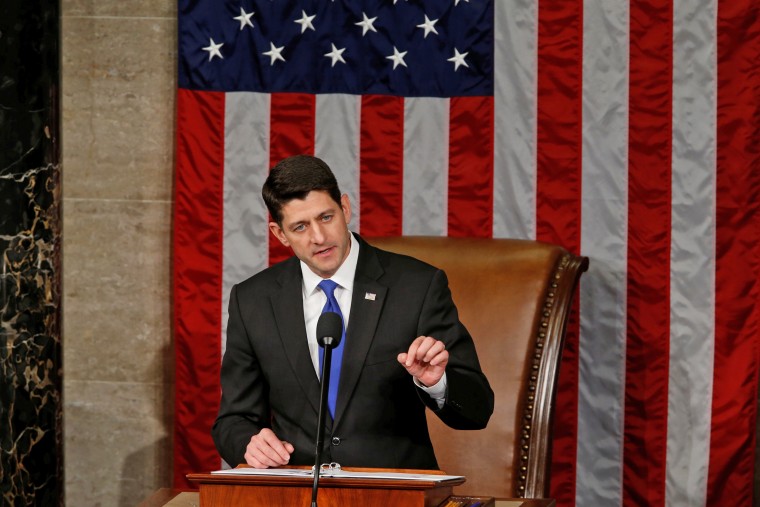As a new Congress convenes Tuesday, Republicans will arrive with a long and aggressive to-do list, emboldened by majorities in the House and the Senate and the promise of President-elect Donald Trump.
Working from a blueprint of the last half-decade, they're anxious to enact the conservative policy agenda that a Democratic White House has thwarted, undoing much of President Barack Obama's legacy in the process.
A repeal of the Affordable Care Act will take top priority, but the list also includes a reversal of environmental regulations they feel has limited energy production as well as financial regulations that they say burdened businesses and employers. Planned Parenthood, one of several women's health organizations Obama took steps to protect with new regulations last month, will find itself once more on the chopping block.
Once the respective bodies finish some initial housekeeping tasks, such as swearing in members and electing the speaker of the House, reversing the past eight years will be the focus — and in less than three weeks, they'll welcome a new Republican president as a strong ally of their cause.
Here’s a look at what the GOP Congress has on its docket right out of the gate this week:
Obamacare Repeal
The top legislative priority for House and Senate Republicans is the repeal of the Affordable Care Act. The first step of that two-step process will begin this week in the Senate with the House following suit shortly after.
Related: Five Things You May Not Know About Obamacare
But Republicans are already facing challenges, even in the repeal process. The cost of repeal is high, with the non-partisan Congressional Budget Office estimating that it would cost $137 billion over 10 years. And then there’s the political fallout. Republicans must decide if they will insert components to appeal to their conservative base, like ending funding for Planned Parenthood, which would risk repelling moderate Republicans that they need for it to pass the Senate.
Democrats are engaging in a messaging offensive in defense of Obamacare and President Barack Obama will meet with Democrats on the Hill on Wednesday to plot strategies to keep parts of the legislation.
Trump’s Nominations
The Senate is responsible for confirming — or defeating — incoming President Donald Trump’s nominees. The only one scheduled thus far is the confirmation hearing of Sen. Jeff Sessions, R-Alabama, to be attorney general. ExxonMobile CEO Rex Tillerson’s confirmation hearing to be secretary of state is tentatively slated for January 11 and Andy Puzder to lead the Labor Department may begin as early as January 12.
Senate Majority Leader Mitch McConnell, pushing for quick confirmations, is using the confirmations of incoming President Barack Obama’s nominee as the standard. He notes that seven of Obama’s nominees were confirmed on his inauguration day.
Related: Key Congressional Players to Watch in 2017
But Democrats point to the lack of public service of many of Trump’s nominees, including Tillerson and Puzder. Democrats argue that these nominees must undergo more thorough vetting, including the release of their tax returns and are threatening to slow-walk the nomination process. Democrats also say that Trump didn’t do basic vetting of his nominees, such as background checks, which is also slowing the process.
United Nations Security Council Resolution on Israel
Bipartisan members in the House and the Senate slammed the United Nations for passing a resolution condemning Israeli settlements in the West Bank. (The U.S. abstained from voting.) According to a joint statement from House Majority Leader Kevin McCarthy and House Foreign Affairs Chair Ed Royce, the House will vote Thursday to condemn the U.N. resolution.
Reversing Obama Regulations
House Republicans are expected to get to work immediately on rolling back some of President Barack Obama’s regulations. They’ll use legislative vehicles, including the REINS Act, which allows Congress to undo some recent regulations that cost the economy more than $100 million. The other mechanism is the Midnight Rules Relief Act, which enables Congress to package rules passed by the administration over the last six months into one repeal package, instead of having to undo one regulation at a time.
New Members Sworn In
The first order of business when Congress convenes on Tuesday is the swearing in of the new and re-elected members. The Senate has seven new members and the House has 52 new members. With four of the new senators being women, the Senate will now have a record number of women serving — 21. It will also have a record number of minority women serving in the upper chamber.
Election of House Speaker Paul Ryan
On Tuesday, the new members of the House will elect the speaker of the House. With Republicans in the majority and most members of the GOP relatively pleased with Ryan, his re-election is sure to go smoothly.
Certifying the Electoral College
On Friday, a joint session of Congress will be convened to certify the results of the electoral college, the final step in the process that will seal the results of the presidential election for Trump.

